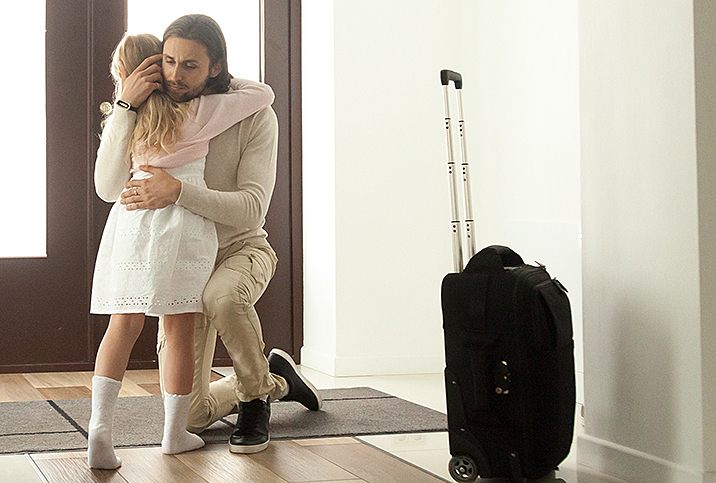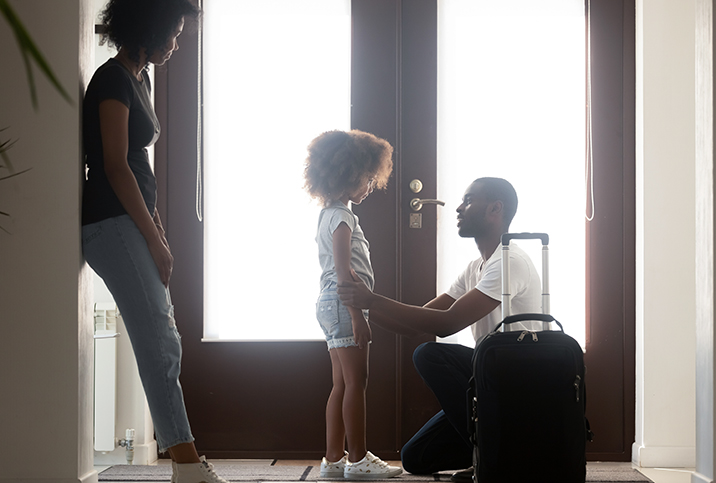You Got Custody of the Kids. Now What?

Four years ago, Angela White divorced her husband of 15 years. They had two children together who were young teens during the divorce. White, 38, who lives in Fairfax County, Virginia, received sole custody of her children, although they keep in contact with their father.
While White's divorce was relatively amicable, she admitted it was still very traumatic for her at first.
"Some days I was feeling really good, and some days reality hit me," she said. "My biggest worry was, 'How am I going to take care of the kids?'"
Parents who have to figure everything out on their own can feel overwhelmed, she explained.
"For me, I had to work harder. I never involved my kids in what I had to do. I just did what I had to do," White said. "I think that's the mindset for most parents who have full custody of their kids."
White wanted to create a platform for people to discuss the life transition that occurs after divorce, so two years ago, she launched the podcast "Life After Divorce With Angie." Many of her listeners have said they sought advice, especially about child custody, in the post-divorce phase.
Keeping it positive
Many recently divorced parents are unsure what to say—and just as importantly, what not to say—to their children when they've been awarded custody, whether solely or jointly.
"A lot of times it can be ugly during divorce, and a lot of times the parents go back and forth and say negative things," White said. "It's not good for the kids. I always kept the conversation between me and their dad. I didn't expose them to our issues."
Matt Pavlov, a divorce attorney in Ocean Springs, Mississippi, said it's important to keep communication about your former spouse with your children as positive as possible.
"Don't talk poorly about the other parent or the other parent's family in front of your children," he said. "Leave your child out of it as much as possible and let the child know that they are entitled and they should be able to love both parents. Act reasonably and kindly toward your children. Respect their feelings."
Pavlov said some parents tell their children more than they need to know when explaining the divorce situation.
"The fact that your husband cheated on you, your kid doesn't necessarily need to know that," Pavlov explained. "They don't need to feel like they have to pick sides."
A counselor can help
Pavlov advises many of his clients to involve a counselor, a third party who can help put what's going on in the proper context for a child.
"Even though you're raising your child, you don't necessarily have the expertise to communicate all these things to children in a way they can comprehend and understand," he said.
Informing children of adult decisions such as divorce and child custody is very difficult, whether they're young kids or teens, said Douglas Ruben, Ph.D., a licensed psychologist who practices in Okemos, Michigan.
"Remember, no matter how much friction or awfulness plagued the marriage, the kids didn't always see it the way you did," Ruben explained. "They grew used to the arguments. That was normal for them. So when you announce the marriage between two partners is over, it feels like their world just blew up."
If possible, Ruben recommended both partners be together when sharing news about divorce and custody with their children.
"Focus on the positive, not the negative," he said. "Stress that the kids were not the reason for the divorce."
What not to say to your children
When telling your kids that you and your spouse won't be living together anymore, emphasize the family is still together, Ruben said. Explain that the goal is to keep their lives the same, even though their parents will live in separate places.
As for what not to say to your kids, Ruben had the following advice:
- Don't blame one partner for the divorce.
- Don't talk about how the adjustment is difficult for everyone. This may make the child think something awful will happen.
- Don't force them to share their feelings about what was just told to them. They are shell-shocked and likely in denial. If they're even able to speak, it may be in anger, exacerbating tensions.
- Don't rationalize one partner's reasons for ending the marriage. All the child hears is, "The family is ending."
Louis Pagano, Ph.D., a practicing psychologist in St. Cloud, Minnesota, recommended parents try putting themselves in their children's shoes.
"If you have custody newly awarded, try to imagine what it's like for your kid," he said. "What would you want to know? How would you want to be told this information?"
Tailor the information you're giving to your children according to their developmental stage. It's normal for children to have worries and questions, such as, "Where will I stay?" "Where will my stuff be?" "When will I see mom?" "When will I see dad?"
"As time passes, they may ask tricky questions, but they'll need to be answered honestly because they're starting to get to that stage where they have some capacity to understand how relationships work," Pagano said.
"Children between the ages of 8 and 12, for example, may need answers to practical questions about their daily routine," he continued. "In general, teens are going to want the most information. It's often appropriate to let them know why the parents are splitting it up. But it might be inappropriate for them to know all of the details of their parent's marriage. Our children are still our children; they're not our friends."
You can get through this
Pagano explained it's important to keep in mind that the more parents fight with each other before, during and after a divorce, the more problems kids may experience.
"Children are not the appropriate outlet to talk about how angry or mad you are with that other parent," Pagano said. "It's really important you try to resist that urge and find other sources of support.
"While divorce and custody arrangements can be contentious and stressful, research indicates that most people, including the children, can cope successfully with the stress," Pagano added. "That's not always the message we see in the media, which often emphasizes the trauma of divorce.
"I say that to, hopefully, give hope to parents that have gone through a divorce," he continued. "It's possible to get through it without any long-term repercussions for yourself or the kids. It definitely takes some work and extra attention. If handled properly, divorce does not lead to any irreversible damage."


















